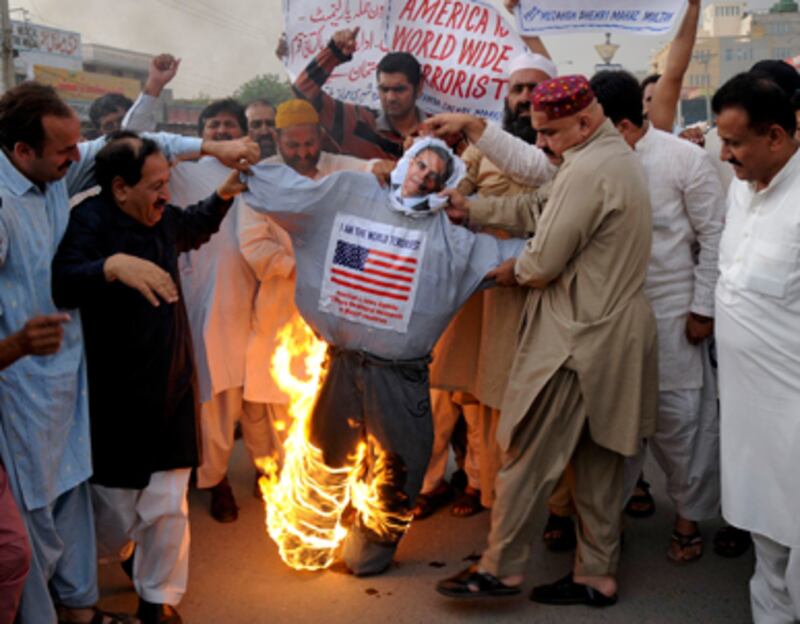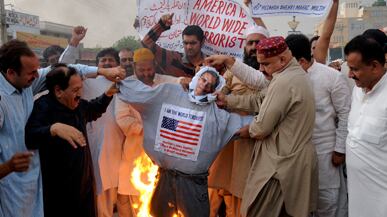America's already deeply troubled relations with Pakistan are likely to get worse. A host of issues divide Washington and Islamabad, and all are getting more difficult to manage.
Pakistan is preparing for further deterioration, building its non-U.S. alliances and options. For Pakistanis, the Abbottabad raid that killed Osama bin Laden was a vivid demonstration that America does not respect its sovereignty and territorial integrity. The presence of American drones flying into Pakistan’s airspace underscores this all the time. For Americans, the fact that bin Laden was hiding for years in a major Pakistani garrison town surrounded by Pakistani army cantonments and retired officers' homes confirmed the U.S. view that the country engages in a complex double game of patronizing some terrorists while fighting others. Both sides are right about the other.

Now al Qaeda is certain to rebuild its infrastructure in Pakistan's heartland, which was damaged by the raid and the intelligence found there. Already al Qaeda's propaganda arm, As-Sahab (in the clouds) media, has reappeared with a message from bin Laden supporting the Arab Spring of revolutions recorded before his death. More is likely to follow as Ayman al-Zawahri and other top leaders eulogize their boss. Their protectors in Pakistan (who may include elements of the army as well as other terrorist groups like Lashkar-e-Taiba) are powerful, determined, and violently anti-American.
Several new court cases in the U.S. are about to expose these connections to the media in vivid detail. They all revolve around the 2008 Lashkar attack on Mumbai in which six Americans were murdered. The confession of David Headley, the already-convicted Chicago-based master spy behind the murders, will highlight the role of army intelligence officers from the Inter-Services Intelligence (ISI) in the funding and planning of the attack and the choice of a Jewish-American target in Mumbai. Headley's partner, Tahawwur Hussein Rana, whose lawyer maintains he was misled by Headley, may actually say he was an ISI paid asset for years on the stand. Another trial has put the ISI's director-general, Brigadier General Pasha, at the center of the plot. His boss, Chief of Army Staff General Parvez Kayani, Pakistan's real power broker, is likely to face charges sooner or later since he was director-general of the ISI in the years during which Mumbai was planned and bin Laden moved to Abbottabad.
Al Qaeda’s protectors in Pakistan (who may include elements of the army as well as other terrorist groups like Lashkar-e-Taiba) are powerful, determined, and violently anti-American.
Pakistan's rapidly growing nuclear-weapons arsenal, soon to be the fifth largest in the world, is another source of friction between Washington and Islamabad. Pakistan is adding more Chinese-built reactors to its fissile material production lines and starting to develop tactical weapons systems. Sooner rather than later, India will need to catch up in the South Asia arms race, placing new pressure on the U.S.-India civil nuclear partnership.
Afghanistan is yet another friction point. Pakistan provides the Taliban with the safe haven it uses to attack NATO forces. As NATO starts to draw down forces, Pakistan's paranoia about India's role in Afghanistan will expand. Pakistan's strongest critics in Afghanistan—like former intelligence chief Amarullah Salih, who said for years that bin Laden was hiding in Pakistan's heartland, protected by the ISI—are becoming both more outspoken and powerful. They oppose any political deal with the Taliban and Islamabad.
U.S.-Pakistan relations will sour as these currents grow deeper. American aid to Pakistan is harder and harder to sell to a skeptical Congress. Why the U.S. should fund Pakistan's misbehavior is a question tougher than ever to answer. Other countries face the same issues on aid to Pakistan.
Pakistan has seen the U.S. cut off aid many ties before in the last half century. It knows Washington is capricious. So it is strengthening its alternatives east and west. China is Pakistan's reliable "all weather" ally. Both Pakistan's civilian and military leaders travel often to Beijing to ensure close cooperation. Chinese engineers are building highways to link Tibet to the Arabian Sea through Pakistan. Saudi Arabia and the United Arab Emirates are key Muslim allies to the west. Pakistan has been the kingdom's largest recipient of aid for decades and Saudi Prince Bandar just visited Islamabad to secure promises of Pakistani troops if the Arab Spring threatens to erupt in the gulf monarchies. A battalion of Pakistani troops is in Bahrain backing up the Saudi and Emirati forces that intervened there this year to crush the Shia protest movement.
Pakistan's most likely next elected leader, former Prime Minister Nawaz Sharif, who has called for an investigation into the Abbottabad affair, lived in exile in Saudi Arabia for years. Its current president, Asif Zardari, spent years in the UAE. Stopping the downward spiral in the relationship will require bold leadership. Obama has promised to visit Pakistan this year but the dates are still not set. Secretary of State Hillary Clinton just postponed a visit. The SEAL raid opened a brief window of soul searching in the army as it got criticized from all corners. That opening will close fast as the generals close ranks.
Bruce Riedel, a former longtime CIA officer, is a senior fellow in the Saban Center at the Brookings Institution. At President Obama’s request, he chaired the strategic review of policy toward Afghanistan and Pakistan in 2009. He is author of the new book Deadly Embrace: Pakistan, America and the Future of the Global Jihad and The Search for Al Qaeda: Its Leadership, Ideology and Future.





